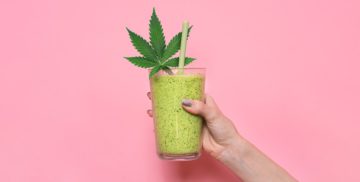An easy-to-digest guide to the pros and cons of taking CBD oil to relieve the symptoms of IBS.
Affecting an incredible 20% of the UK population, Irritable Bowel Syndrome (IBS) is a long-term digestive condition that causes discomfort and bloating.
Sufferers of IBS find the condition to be debilitating and frustrating; with no known cure, patients are told to manage their symptoms through diet and exercise.
If you are a sufferer of IBS or just need some questions answered about the condition, our guide to how using CBD oil can help relieve the symptoms of IBS.
CBD – What Is It?
Cannabidiol (CBD) is a compound extracted from the cannabis plant and used as a medicine for a range of different conditions. It is non-intoxicating, so doesn’t get the user ‘high’ like cannabis would. It also has no known overdose limit and has proven to be non-addictive.
CBD belongs to a group of compounds called cannabinoids, all of which have their own physiological properties when consumed. CBD has been hailed for having medical qualities; helping relieve the symptoms of many conditions such as epilepsy, chronic pain and IBS.
IBS – What Is It?
IBS is a long-term digestive condition that causes the person sporadic bouts of pain and discomfort in their bowels. A source of frustration for the patient, IBS can go a long time before being diagnosed, resulting in the patient making lots of trips to and from the hospital trying lots of different types of medication.
IBS displays itself in ‘episodes’ where the person experiences stomach cramps as well as bloating, constipation, flatulence and diarrhoea.
Is CBD The Solution to Symptoms Of IBS?
Patients of IBS usually feel at a loose-end when seeking medical treatment because doctors are unable to provide a cure. Suggestions of antispasmodics, stool hardeners and even anti-depressants are common from medical professionals. All of which come with a range of side-effects. However, it seems that CBD is filling the gap of relieving the symptoms of IBS without so many debilitating side-effects…
In What Way Does CBD Help With IBS?
CBD oil is a treatment that is becoming extremely common as it appears to be a revolutionary way of minimizing the ways in which the symptoms of IBS manifest, doing so by: –
- Reducing Intestinal Inflammation
- Regulating Pain
- Improving Appetite
Reduces Intestinal Inflammation
The gut becomes inflamed from an auto-immune response which causes the cells of the immune system to attack the lining of the intestine. This can be brought on by food, viruses or bacteria in the gut that the immune system sees as a threat.
CBD is well known as an anti-inflammatory and will act to reduce any inflammation in the gut.
Regulates pain
The common side-effects of IBS are pain, discomfort and nausea, all of which when untreated play a part in ruining the quality of life of the patient.
CBD is known for its pain-relieving and anti-sickness qualities, all without causing side-effects associated with common pharmaceutical alternatives, meaning that CBD can give back a certain quality of life to those with IBS.
Improved appetite
Patients who have IBS generally suffer weight loss as a side-effect of bloating and nausea. The consequence of weight loss for an IBS patient can be extremely serious.
When CBD reduces the symptoms of bloating and nausea, it helps return the appetite of the patient to a normal level.
Other Treatments For IBS
IBS is caused by inflammation in the gut, but the cause of the inflammation is unknown and will vary from patient to patient. Most common treatments for IBS work on trying to prevent the initial symptoms from flaring up, and generally accepted treatments are: –
- Adjustment to diet;
- Adjustment of lifestyle;
- Probiotics
Adjustment to diet
Although the causes are unknown, diet is believed to play a major part in IBS. By reducing the amount of processed food and replacing it with fresh ingredients, the symptoms of IBS can be less severe. A well-balanced diet with fruits, vegetables, fresh-fish whilst cutting out processed sugars and alcohol can go a long way.
Patients can also try and reduce common allergens such as gluten, lactose, eggs etc… to see if that helps reduce any symptoms.
Adjustment to lifestyle
In addition to changing their diet, IBS patients are advised to make changes to their lifestyle in order to reduce stress, since a stressful lifestyle is linked to causing IBS in some cases. Meditation, exercise and a regular sleeping pattern can be beneficial to the symptoms of IBS.
Probiotics
IBS has also been linked to an imbalance in gut bacteria. Prolonged use of antibiotics or a consistent lack of healthy bacteria in a patient's diet can cause the gut bacteria to become unstable, which could cause IBS to flare up. Probiotics are live bacteria and yeasts that can be found in supplements or added to health-focused yoghurts and can help reduce the symptoms of IBS.
Conclusion
The rise of IBS and other digestive disorders has been heavily linked with an increase in processed, unhealthy diets and stressful lifestyles. The first port of call for IBS sufferers should be to make changes to their lifestyle. For the adjustment period of making the changes, supplementing the diet with CBD can go a long way in reducing the life-changing symptoms of IBS.

















